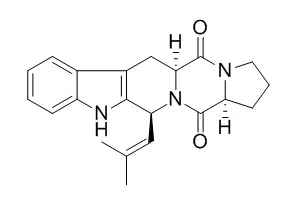Natural Products

- ChemFaces is a professional high-purity natural products manufacturer.
- Product Intended Use
- 1. Reference standards
- 2. Pharmacological research
- 3. Inhibitors




| Size /Price /Stock | 10 mM * 1 mL in DMSO / Inquiry | Other Packaging | *Packaging according to customer requirements(100uL/well, 200uL/well and more), and Container use Storage Tube With Screw Cap |

| Size /Price /Stock | 10 mM * 100 uL in DMSO / Inquiry / In-stock 10 mM * 1 mL in DMSO / Inquiry / In-stock | Related Libraries |
| Description: | Demethoxyfumitremorgin C and tryprostatin B are fungal inhibitors of mammalian cell cycle progression at the G(2)/M transition. Demethoxyfumitremorgin C inhibits the proliferation of PC3 human prostate cancer cells via the intrinsic (mitochondrial) and extrinsic pathway, followed by downstream events leading to apoptotic cell death, it could therefore, serve as a useful agent to treat human advanced prostate cancer. | |||
| Targets: | PI3K | Akt | Bcl-2/Bax | Caspase | PARP | Antifection | |||
| In vitro: |
|
| Source: | The metabolites of Aspergillus fumigatus. |
| Solvent: | Chloroform, Dichloromethane, Ethyl Acetate, DMSO, Acetone, etc. |
| Storage: | Providing storage is as stated on the product vial and the vial is kept tightly sealed, the product can be stored for up to 24 months(2-8C). Wherever possible, you should prepare and use solutions on the same day. However, if you need to make up stock solutions in advance, we recommend that you store the solution as aliquots in tightly sealed vials at -20C. Generally, these will be useable for up to two weeks. Before use, and prior to opening the vial we recommend that you allow your product to equilibrate to room temperature for at least 1 hour. Need more advice on solubility, usage and handling? Please email to: service@chemfaces.com |
| After receiving: | The packaging of the product may have turned upside down during transportation, resulting in the natural compounds adhering to the neck or cap of the vial. take the vial out of its packaging and gently shake to let the compounds fall to the bottom of the vial. for liquid products, centrifuge at 200-500 RPM to gather the liquid at the bottom of the vial. try to avoid loss or contamination during handling. |
 Cell. 2018 Jan 11;172(1-2):249-261.e12. doi: 10.1016/j.cell.2017.12.019.IF=36.216(2019)
Cell. 2018 Jan 11;172(1-2):249-261.e12. doi: 10.1016/j.cell.2017.12.019.IF=36.216(2019) Cell Metab. 2020 Mar 3;31(3):534-548.e5. doi: 10.1016/j.cmet.2020.01.002.IF=22.415(2019)
Cell Metab. 2020 Mar 3;31(3):534-548.e5. doi: 10.1016/j.cmet.2020.01.002.IF=22.415(2019) Mol Cell. 2017 Nov 16;68(4):673-685.e6. doi: 10.1016/j.molcel.2017.10.022.IF=14.548(2019)
Mol Cell. 2017 Nov 16;68(4):673-685.e6. doi: 10.1016/j.molcel.2017.10.022.IF=14.548(2019)| 1 mg | 5 mg | 10 mg | 20 mg | 25 mg | |
| 1 mM | 2.8618 mL | 14.309 mL | 28.618 mL | 57.2361 mL | 71.5451 mL |
| 5 mM | 0.5724 mL | 2.8618 mL | 5.7236 mL | 11.4472 mL | 14.309 mL |
| 10 mM | 0.2862 mL | 1.4309 mL | 2.8618 mL | 5.7236 mL | 7.1545 mL |
| 50 mM | 0.0572 mL | 0.2862 mL | 0.5724 mL | 1.1447 mL | 1.4309 mL |
| 100 mM | 0.0286 mL | 0.1431 mL | 0.2862 mL | 0.5724 mL | 0.7155 mL |
| Structure Identification: |
|